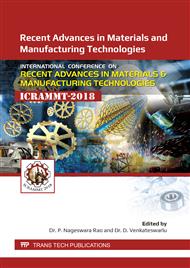p.335
p.343
p.349
p.355
p.361
p.367
p.373
p.380
p.386
Analysis of the Tribological Properties of Commercial Pure (CP) Aluminum Developed by Chip Consolidation through Equal Channel Angular Pressing (ECAP)
Abstract:
The goal of this research work is to study the role of equal channel angular pressing on consolidation behavior of machined chips of CP Al through ECAP. The chips are collected by orthogonal cutting with cutting edge angle 75° and depth of cut 0.2 mm. The ECAP die with Φ = 90° (channel angle) and Ψ = 20° (corner angle) is used for consolidation of machined chips. The consolidation is done by pre-heating the chips at 200°C upto four passes through processing route BC. The maximum density of 99% and hardness of 94 HV was obtained after 4 ECAP passes. Tribological properties is evaluated by Pin-on-disc dry wear testing for three different loads at a constant sliding speed 750 RPM and distance of 5 kms. Chip consolidated CP Al is inferior in wear resistance with as-received CP Al owed to localised debonding of chips with the sliding disc.
Info:
Periodical:
Pages:
361-366
DOI:
Citation:
Online since:
August 2019
Price:
Сopyright:
© 2019 Trans Tech Publications Ltd. All Rights Reserved
Share:
Citation:


